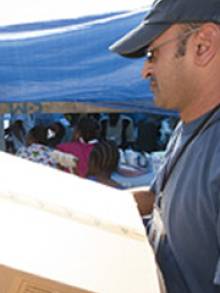Sharad Aggarwal, Ellen O’Connell
MPA in Public & Nonprofit Management & Policy
-
2008

"Several alumni work for organizations that have been instrumental to the relief efforts in Haiti since the earthquake hit on January 12, 2010. Two alums, Sharad Aggarwal (MPA 2008) and Ellen O’Connell (MPA 1990) recently shared about the efforts their organizations are undertaking.
Aggarwal is the Director of Programs at the United Methodist Committee on Relief (UMCOR) and was deployed to Haiti with a response team that is scaling up emergency and early recovery operations and partnering with the Eglise Methodiste d’Haiti (EMH), other ecumenical partners, and a Canadian NGO, GlobalMedic.
“UMCOR is partnering with GlobalMedic to provide clean drinking water, treatment for severe diarrhea, and medical attention to those in need,” explains Aggarwal. “UMCOR is also supporting GlobalMedic's deployment of paramedics, water technicians, and a doctor to assist those sick or injured,” he continues.
“A hub for water distribution has also been set up to provide 65,000 people daily with clean drinking water. In addition, more than 100,000 sachets of PUR water purifiers, five million Aquatab water purification tablets, and over 100,000 oral rehydration sachets are being distributed to those who have been forced from their homes as a result of the earthquake.
“UMCOR’s disaster response team and GlobalMedic are working in partnership with local non-government organizations (NGOs) and the United Nations’ network of relief organizations to coordinate response efforts and give aid to areas not receiving direct assistance. Additionally, UMCOR has commenced food distributions to vulnerable households whose homes were destroyed in Leogane and has provided emergency grants to the Methodist Church in Haiti,” Aggarwal says.
O’Connell is the Vice President for Administration and Board Relations at the International Rescue Committee (IRC). Her position “includes overseeing the Global Procurement Operations, Facilities and Board Relations for the IRC,” she explains.
O’Connell notes that the IRC is “one of the first to respond, one of the last to leave” and has “been a leader in humanitarian relief” for over 75 years. “We mobilize quickly [and our] Emergency Team is on the ground in Haiti to deliver help to the devastated city of Port-au-Prince. Our team will be working with local aid groups to provide vital help to survivors. The team has visited sites in the battered city of Port-au-Prince to assess damage and determine where to deliver humanitarian assistance. Team leader Gillian Dunn said that damage to the city was “enormous and overwhelming.”
“The scale of destruction in Haiti's capital of Port-au-Prince is enormous,” O’Connell continues. “Buildings have been leveled and those that remain standing are largely uninhabitable. Thousands of families have gathered in makeshift tents using nothing more than bed sheets and rope. Sanitation is already a major challenge,“Dunn reports, ""people are gathering in any public space, including parks and the sides of roads. At dusk, families place cinder blocks in the road to prevent traffic from coming through. Then they lay their bed sheets down so they can sleep.” ”
“The sheer magnitude of the logistical challenges due to the massive infrastructure devastation certainly makes this response effort unique,” explains Aggarwal. “As a humanitarian organization, UMCOR is as affected as any actors in Haiti by the environment in which we operate, and issues of access to fuel, communications, secure cash transfer mechanisms, and movement of other resources impact our ability to meet the needs of the population. So far the coordination efforts have been slow, but it has been improving every day.”
“Our work in Haiti going forward is dedicated to the memory of UMCOR’s chief executive, Rev. Dr. Sam Dixon, who was in Haiti to promote partnerships for health care improvement but died as a result of injuries suffered in the earthquake. UMCOR has had a presence in Haiti for many years and our long-standing relationship with local churches and partners enables us to coordinate a reliable distribution process so that people who are most in need are reached as quickly as possible and given as much dignity as possible,” he says.
Long-standing relationships are important to the IRC as well. Says O’Connell, “basic needs such as fresh water, medical care, and sanitation remain an urgent priority, and the IRC team is helping rush these necessities to the earthquake victims. But our focus, even in these early days, is on the long-term needs of the Haitian people as they work to rebuild their country and their lives.”
“We are giving particular attention to two urgent areas in which we have considerable expertise,” she explains. “First, protecting children and providing safe spaces amidst the continuing chaos; and second, addressing the sexual violence and other security issues certain to be exacerbated by the disaster.”
“In the coming days we will know more about the ways that the IRC can make the greatest positive impact in Haiti,” O’Connell goes on. “We will draw on deep and longstanding relationships with Haitian refugees resettled by the IRC over the past five decades. These contacts will help us identify and develop strong partnerships with local organizations in Haiti. As is our practice, we will build local capacity and community participation, ensuring that our impact will have lasting value even after the IRC departs.”
To support the relief effort in Haiti, visit the IRC or UMCOR online. 100% of your donations will go toward Haiti Emergency Relief. "